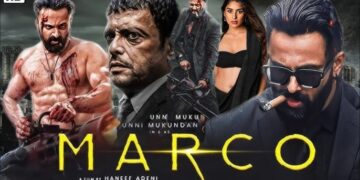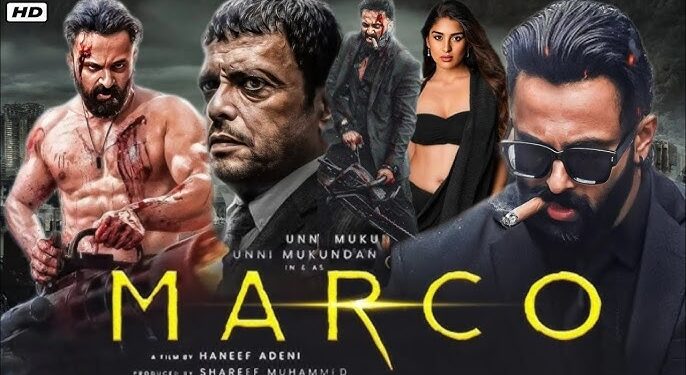Post-Credit Scene: A Review of Marco‘s Dismal Impact on Malayalam Cinema
Marco, the latest Malayalam-language action film starring Unni Mukundan, takes an exasperating hour to get to the point. In a film that disregards the fundamentals of drama, it leans on empty provocations rather than delivering meaningful engagement. What’s even more disheartening is how the film fails to live up to the standards set by its own industry, falling prey to the same mistakes that have plagued other southern filmmakers.
In contrast, filmmaker Ram Gopal Varma, known for his eccentric style, has earned a kind of free pass due to his groundbreaking earlier works. Audiences, willing to forgive his recent cinematic misfires, will cheerfully overlook his more sleazy, incoherent efforts once he produces a film that even remotely mirrors the energy of Satya. But beyond his eccentricity, Ramu is also an astute cultural observer. In an interview with Pinkvilla, he remarked that southern filmmakers focus more on spectacle than substance. He claimed that many directors are not concerned with the intellectual aspects of their films and that actors often care more about their ‘entry scene’ than the actual story. At first, one might think he was referring to the swarm of copycat films that have followed in the wake of SS Rajamouli’s successes — think Salaar: Part 1 – Ceasefire, Kalki 2898 AD, or Kantara. But as you watch Marco, you realize that Ramu’s critique might also apply to the Malayalam film industry. Marco, the highest-grossing Malayalam film of the past few months, seems to have learned all the wrong lessons from the more mainstream South Indian cinema.

What stands out about Marco is not its shocking violence, but its lack of narrative depth. The violence — from the disturbing murder of a pregnant woman to the senseless cruelty toward her baby — seems to exist only to shock, with no underlying message or purpose. While extreme films like A Serbian Film can be shocking due to their deep political commentary, Marco offers no such depth. It’s just mindless brutality for the sake of it. However, it would be unfair to expect profound storytelling from a film that never aspires to be anything other than an action-packed spectacle. The criticism here lies in the film’s weak storytelling and lack of investment in its characters or themes.
A key misstep of Marco comes from its narrative choices. The protagonist, Marco, is kept several steps behind the audience throughout the film. In a particularly egregious moment, Marco’s brother Victor, a blind man, is killed for witnessing a crime. The film wastes no time revealing the perpetrators and explaining their motives, making Marco’s quest for vengeance redundant. We, the viewers, know exactly who’s responsible, which eliminates any sense of suspense or engagement. Even when Marco does realize the villains’ role in his brother’s death, it’s only after an agonizingly slow hour of pointless investigation. This decision ultimately robs the film of any real stakes.
The plot becomes even more absurd when one of the villain’s sons is placed within Marco’s team to sabotage his investigation. This twist is meant to add intrigue, but instead, it highlights just how much the film’s hero is stumbling through his investigation with little intellect or insight. It’s an all-too-familiar trope, reminiscent of Prashanth Neel’s K.G.F films, where characters are constantly told how tough or dangerous they are, rather than showing it through their actions.

The film’s first hour is particularly tedious, and it only begins to find some direction in its ‘interval block’ when Marco belatedly uncovers the betrayal that has been evident to the audience all along. This lack of awareness leaves the audience checking their watches, waiting for Marco to catch up. Even Animal, a film that pales in comparison to Marco, avoids this pitfall by keeping the audience more in the loop. In contrast, Marco stumbles its way through the first half, chasing false leads and letting its heroes (and entire families) be slaughtered without much consequence.
Ultimately, Marco exists to provoke, but even this is done poorly. It’s not that films need to examine the consequences of violence or delve deeply into revenge’s futility, but Marco fails even at that basic level. It’s a film that doesn’t succeed in its own goal, offering nothing more than a spectacle that is neither engaging nor thought-provoking.
What’s truly jarring, however, is how little Marco seems to care about its characters. One of the most absurd scenes in the film is when Marco, in the aftermath of his nephew’s brutal death, calmly proceeds to dress up in a fancy suit and spray cologne on himself. This shallow, disconnected moment feels emblematic of the film’s approach: prioritizing style over substance. As Ram Gopal Varma noted, today’s filmmakers are more concerned with individual moments and dramatic scenes than they are with crafting meaningful arcs and narratives.

This point is further driven home by the film’s villain, who, after duping Marco, smugly says, “Good job! I appreciate your valour. But I am sorry about your brain. It doesn’t function properly.” And in that line, you find a sad summation of the film itself: Marco is more concerned with showing off its ‘cool’ moments than building any meaningful narrative. In the end, it’s hard to invest in a film or its protagonist when nothing in the story is earned, and everything feels like an empty spectacle for spectacle’s sake.
For all the goodwill the Malayalam film industry has cultivated over the years, Marco manages to squander it, showing that even in a market known for its creativity and boldness, films can still miss the mark.
Disclaimer: This is an AI-generated live blog and has not been edited by Localtak staff.
Also Read : Shriya Saran shares her insights on fitness, diet, and lifestyle















 Categories
Categories









